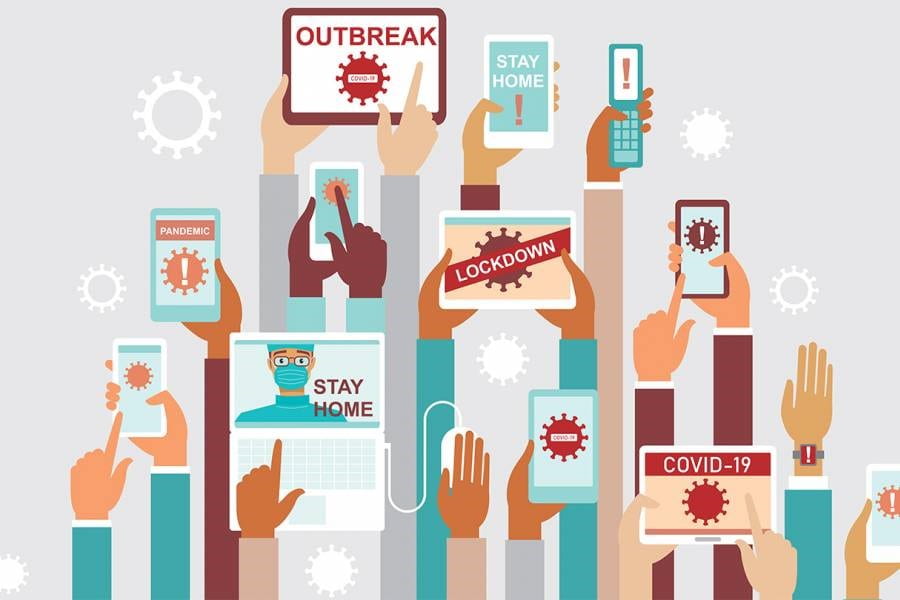I was really thrilled to reflect on this very topical issue because this video conference by Ivan Sigal and Ezster Hargittai is particularly meaningful to me since I have long been interested in information disorder via social media. I had the opportunity to view a project called the civic media observatory that has helped understand the framework of Covid 19 and social networking. As Cinelli(2020) mentions, I am surely very familiar with the theory that the internet was going to be a democratizing force in terms of information access and diverse voices.There’s a couple of specialized projects called rising voices, translation community and advocs, which focuses on online freedom of expression online human rights and digital rights. I believe that the way individuals engage with different social media platforms and the distinctiveness of the people who use them both have a significant impact in the transmission of knowledge and disinformation.
Ivan Sigal and Ezster Hargittai describe how information disorder has affected the media process throughout the current pandemic. This description crystalized for me when I noticed the ongoing misleading information spreading via social media sites such as Twitter and Youtube, particulary in terms of the necessity of mask and injection. The COVID-19 pandemic demonstrates how critical this new information environment may be. The dissemination of information has a significant influence on how individuals behave and the efficacy of government remedies. Previously, I never considered that such a phenomenon could impact people’s lives. Bolsover (2020) states that wonderful things would happen if we lived in hyperconnected societies where we could access any information with a click or swipe. This idealistic image was rapidly overtaken by a new one a few years ago: that our information ecology has become dangerously contaminated and is no longer connecting us. Social networking sites has really been a way to spread misleading information about health (Wang et al., 2019). There are times when misinformation about health can make people angry or confuse them about proof health advice or scientific health data, which can make them less likely to follow them (Tan et al., 2015). Tan (2015) also stated that Twitter feeds showed posts saying that Ebola could be healed with blood transfusions or by the tropical climate tree ewedu. This happened during the Ebola epidemic in West Africa in 2014. Although we ,young individuals,are less likely to become ill with COVID-19, we are a key group in the pandemic and can help reduce transmission,being active online. We utilize an average of five digital channels every day (Twitter, TikTok, WeChat, Instagram).
Overall, I have come to the realization that the complexities of informational disarray are well-known. I have come across misleading headlines, clumsy pictures, and sarcasm that plays tricks are all examples of low-level informational pollution, but there is also skilled deception. As the COVID-19 epidemic unfolded, the transmission of disinformation was accelerated on social media and other digital platforms, which now pose a greater danger to global public health than the virus itself. To comprehend, explain, and address these issues, the language we employ is critical. Terminology and meanings are significant(Wardle,2017).
References
Bolsover, G., & Tizon, J. T. ,2020. Social Media and Health Misinformation during the US COVID Crisis. arXiv preprint arXiv:2008.05271.
Cinelli, M., Quattrociocchi, W., Galeazzi, A., Valensise, C. M., Brugnoli, E., Schmidt, A. L., … & Scala, A. ,2020. The COVID-19 social media infodemic. Scientific Reports, 10(1), 1-10.
Tan, A., Lee, C., & Chae, J., 2015. Exposure to Health (Mis)Information: Lagged Effects on Young Adults’ Health Behaviors and Potential Pathways. Journal of Communication, 65(2015), 674 – 698.
Wang, Y., McKee, M., Torbica, A., & Stuckler, D. ,2019. Systematic Literature Review on the Spread of Health-related Misinformation on Social Media. Social Science and Medicine, 240(November 2019).
Wardle, C., & Derakhshan, H.,2017. Information disorder: Toward an interdisciplinary framework for research and policy making. Council of Europe, 27.
